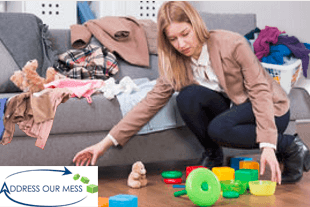
A lot of hoarding situations stem from mental illnesses or physical limitations, but just as many stem from a simple lack of time. It’s difficult to maintain a clean home when we’re so busy with social, work, and personal responsibilities. Clutter is an easy thing to push to the side and forget about, until suddenly you can’t ignore it. It starts out filling the garage and basement and before you know it, it’s spilling out into closets, bedrooms, and living areas. Tackling a big cleaning project is much harder than taking small steps over time, so here are some tips to help you tackle your clutter before it turns into a true hoarding situation.
1. Clear off Counter Clutter
One of the first signs of hoarding is when belongings start to take over the functional areas of the home. If you start to let clutter pile up on counters and table tops, you’re making those areas unusable. If things stay there long enough we start to think that’s where they belong and a mountain of things on our table tops can get overwhelming quickly. Take steps to avoid counter clutter by going through mail as soon as you get it, finding a home for all the stuff that seems to keep ending up on the counter, and purging whatever you don’t use and need.
2. Work on Organizational Spaces
Clutter usually starts to build up in living spaces because the places where they actually belong are disorganized. Even though you know those shoes belong in the closet, you leave them on the floor because the closet’s full. Little clutter build ups like these lead to out of control clutter once we let stuff go for too long. Start by clearing out closets, drawers, and cabinets so when you go to clean up main living areas, everything has a place to go. And don’t feel like you need to clean every organizational space at once. Set aside an hour or a day to clean one closet or one drawer and don’t try to tackle everything at once.
3. Don’t Think to Trash
It sounds crazy to say don’t think about throwing things away when you’re clutter cleaning, but the idea of trashing their belongings scares some people. Instead, think about selling or donating things you don’t use. People are usually a lot more receptive of letting go of their belongings if they know they’re going to get something back for it, whether it’s money or doing a good deed. You’ll inevitably have to trash some things, but it might help the clutter cleaning process if you go in with a donate first mindset.
4. Change your Habits
Tackling clutter really is a daily process. As we move around and use our homes things naturally become displaced, so the only way to keep an organized home is to get in the habit of picking up daily. Start with things like cleaning up after each meal, and putting your used items back in their designated spaces every night.
If you’re afraid your home is already beyond these tips, there’s no need to panic. Large cleanup projects are only overwhelming if you’re doing it alone and Address Our Mess is here to make sure that doesn’t happen. Our teams will work with you to sort, organize, and dispose of your items so you can get back to having the organized home you dream about. Check out our locations to find a team in your area.